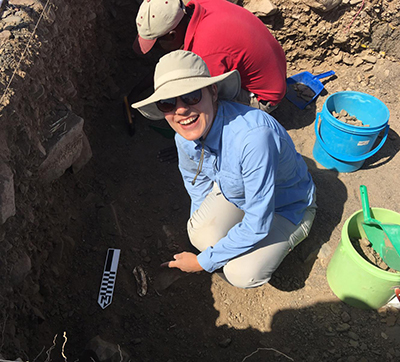The Human-Animal Relationship

The department welcomed Assistant Professor Anneke Janzen to our faculty in fall 2019. Janzen holds a PhD in anthropology from the University of California, Santa Cruz. She joined us after completing post-doctoral appointments at the Cotsen Institute of Archaeology at the University of California, Los Angeles, and the Max Planck Institute for the Science of Human History in Jena, Germany. She remains a research affiliate of both institutions.
Janzen specializes in zooarchaeology, exploring the relationships between people and animals in the past. A major focus of her work has been discovering how the practice of herding spread across Africa (c. 5000 to 2000 BP), and how early herders in Kenya, Tanzania, and Zambia used the landscape and managed their domestic animals. She also studies the effects of colonialism and the introduction of domesticated herd animals on the diets of indigenous and colonizing people and on the environment of North America. Her findings appear in highly respected journals including Palaeogeography, Palaeoclimatology, Palaeoecology, Journal of Archaeological Science, Proceedings of the National Academy of Sciences of the United States of America, and Quaternary Science Reviews, among others.
Janzen’s expertise in stable isotope analysis and zooarchaeology by mass spectrometry (ZooMS) adds cutting-edge, minimally destructive chemical and biomolecular methods of identification and analysis to the department’s longstanding strengths in zooarchaeological research based on skeletal anatomy. Carbon stable isotope analysis of animal remains provide information about the plants that animals ate while they were alive, while strontium stable isotopes contribute to our understanding of human and animal mobility. ZooMs allows researchers to identify bones, based on peptide-fingerprinting of collagen, that are too fragmentary or too similar for standard methods of skeletal identification.